| Listing 1 - 10 of 134 | << page >> |
Sort by
|
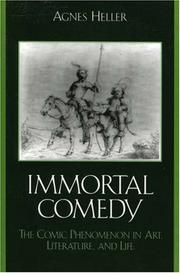
ISBN: 0739109197 0739156241 9780739156247 9780739109199 0739112465 9780739112465 Year: 2005 Publisher: Lanham Lexington Books
Abstract | Keywords | Export | Availability | Bookmark
 Loading...
Loading...Choose an application
- Reference Manager
- EndNote
- RefWorks (Direct export to RefWorks)
This book is the first attempt to think philosophically about the comic phenomenon in literature, art, and life. Working across a substantial collection of comic works author Agnes Heller makes seminal observations on the comic in the work of both classical and contemporary figures. Whether she's discussing Shakespeare, Kafka, Rabelais, or the paintings of Brueghel and Daumier Heller's Immortal Comedy makes a characteristic contribution to modern thought across the humanities.
Comic, The. --- Ludicrous, The --- Ridiculous, The --- Comedy --- Wit and humor
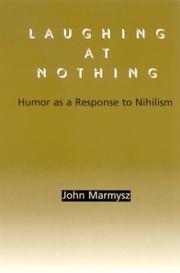
ISBN: 0791486281 1417536209 9781417536207 0791458407 9780791458402 0791458393 9780791458396 9780791486283 Year: 2003 Publisher: Albany State University of New York Press
Abstract | Keywords | Export | Availability | Bookmark
 Loading...
Loading...Choose an application
- Reference Manager
- EndNote
- RefWorks (Direct export to RefWorks)
Disputing the common misconception that nihilism is wholly negative and necessarily damaging to the human spirit, John Marmysz offers a clear and complete definition to argue that it is compatible, and indeed preferably responded to, with an attitude of good humor. He carefully scrutinizes the phenomenon of nihilism as it appears in the works, lives, and actions of key figures in the history of philosophy, literature, politics, and theology, including Nietzsche, Heidegger, Camus, and Mishima. While suggesting that there ultimately is no solution to the problem of nihilism, Marmysz proposes a way of utilizing the anxiety and despair that is associated with the problem as a spur toward liveliness, activity, and the celebration of life.
Comic, The. --- Nihilism (Philosophy) --- Ludicrous, The --- Ridiculous, The --- Comedy --- Wit and humor --- Philosophy
Book
ISBN: 9786611925666 1281925667 0199700982 9780199700981 9780195381221 019538122X 9780195381238 0195381238 661192566X 9781281925664 019772504X 0190452331 Year: 2023 Publisher: Oxford : Oxford University Press,
Abstract | Keywords | Export | Availability | Bookmark
 Loading...
Loading...Choose an application
- Reference Manager
- EndNote
- RefWorks (Direct export to RefWorks)
In this latest addition to Oxford's 'Modernist Literature & Culture' series, renowned modernist scholar Michael North poses fundamental questions about the relationship between modernity and comic form in film, animation, the visual arts, and literature. 'Machine-Age Comedy' vividly constructs a cultural history that spans the entire twentieth century, showing how changes wrought by industrialization have forever altered the comic mode. With keen analyses, North examines the work of a wide range of artists - including Charlie Chaplin, Walt Disney, Marcel Duchamp, Samuel Beckett, and David Foster Wallace - to show the creative and unconventional ways the routinization of industrial society has been explored in a broad array of cultural forms.
Comedy films --- Comedy --- Comic, The. --- Ludicrous, The --- Ridiculous, The --- Wit and humor --- History and criticism.
Book
ISBN: 1283639394 1442217588 9781442217560 1442217561 9781442217584 9781283639392 Year: 2012 Publisher: Lanham, Md. Rowman & Littlefield Publishers
Abstract | Keywords | Export | Availability | Bookmark
 Loading...
Loading...Choose an application
- Reference Manager
- EndNote
- RefWorks (Direct export to RefWorks)
In Shocked But Connected, distinguished filmmaker Michael Roemer reflects on the nature of comedy and laughter. Incorporating the work of both the great thinkers and great comedians of our age, Roemer investigates what makes us laugh and what distinguishes comedy from all other art forms.
Comic, The. --- Wit and humor --- Laughter. --- Laughing --- Emotions --- Nonverbal communication --- Ludicrous, The --- Ridiculous, The --- Comedy --- Philosophy.
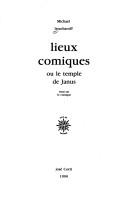
ISBN: 2714303692 9782714303691 Year: 1990 Publisher: Paris Corti
Abstract | Keywords | Export | Availability | Bookmark
 Loading...
Loading...Choose an application
- Reference Manager
- EndNote
- RefWorks (Direct export to RefWorks)
Comparative literature --- Thematology --- Comedy --- Comic, The --- Ludicrous, The --- Ridiculous, The --- Wit and humor --- Comic literature --- Literature, Comic --- Drama --- CDL --- 82
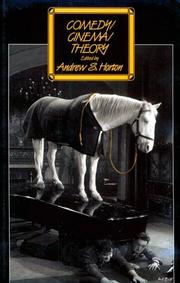
ISBN: 0520910257 058529948X 9780520910256 9780585299488 0520069978 9780520069978 0520070402 9780520070400 Year: 1991 Publisher: Berkeley University of California Press
Abstract | Keywords | Export | Availability | Bookmark
 Loading...
Loading...Choose an application
- Reference Manager
- EndNote
- RefWorks (Direct export to RefWorks)
The nature of comedy has interested many thinkers, from Plato to Freud, but film comedy has not received much theoretical attention in recent years. The essays in Comedy/Cinema/Theory use a range of critical and theoretical approaches to explore this curious and fascinating subject. The result is a stimulating, informative book for anyone interested in film, humor, and the art of bringing the two together. Comedy remains a central human preoccupation, despite the vagaries in form that it has assumed over the centuries in different media. In his introduction, Horton surveys the history of the study of comedy, from Aristophanes to the present, and he also offers a perspective on other related comic forms: printed fiction, comic books, TV sitcoms, jokes and gags. Some essays in the collection focus on general issues concerning comedy and cinema. In lively (and often humorous) prose, such scholars as Lucy Fischer, Noel Carroll, Peter Lehman, and Brian Henderson employ feminist, post-Freudian, neo-Marxist, and Bakhtinian methodologies. The remaining essays bring theoretical considerations to bear on specific works and comic filmmakers. Peter Brunette, William Paul, Scott Bukatman, Dana Polan, Charles Eidsvik, Ruth Perlmutter, Stephen Mamber, and Andrew Horton provide different perspectives for analyzing The Three Stooges, Chaplin, Jerry Lewis, Woody Allen, Dusan Makavejev, and Alfred Hitchcock's sole comedy, Mr. and Mrs. Smith, as well as the peculiar genre of cynical humor from Eastern Europe. As editor Horton notes, an over-arching theory of film comedy does not emanate from these essays. Yet the diversity and originality of the contributions reflect vital and growing interest in the subject, and both students of film and general moviegoers will relish the results.
Comedy films --- Comic, The --- Film --- Music, Dance, Drama & Film --- Ludicrous, The --- Ridiculous, The --- Comedy --- Wit and humor --- History and criticism
Book
ISBN: 1316153525 1316153029 0511816855 0521832608 0521540267 Year: 2009 Publisher: Cambridge : Cambridge University Press,
Abstract | Keywords | Export | Availability | Bookmark
 Loading...
Loading...Choose an application
- Reference Manager
- EndNote
- RefWorks (Direct export to RefWorks)
'Laughter', says Eric Weitz, 'may be considered one of the most extravagant physical effects one person can have on another without touching them'. But how do we identify something which is meant to be comic, what defines something as 'comedy', and what does this mean for the way we enter the world of a comic text? Addressing these issues, and many more, this is a 'how to' guide to reading comedy from the pages of a dramatic text, with relevance to anything from novels and newspaper columns to billboards and emails. The book enables you to enhance your grasp of the comic through familiarity with characteristic structures and patterns, referring to comedy in literature, film and television throughout. Perfect for drama and literature students, this Introduction explores a genre which affects the everyday lives of us all, and will therefore also capture the interest of anyone who loves to laugh.
Comedy --- Comic, The. --- Ludicrous, The --- Ridiculous, The --- Wit and humor --- Comic literature --- Literature, Comic --- Drama --- History and criticism --- Theory, etc.
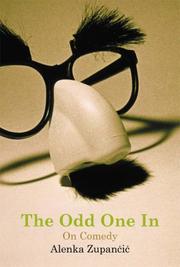
ISBN: 9780262740319 Year: 2008 Publisher: Cambridge, Mass. The MIT Press
Abstract | Keywords | Export | Availability | Bookmark
 Loading...
Loading...Choose an application
- Reference Manager
- EndNote
- RefWorks (Direct export to RefWorks)
Aesthetics of art --- Drama --- Comedy. --- Comic, The. --- Comedy --- Comic, The --- Ludicrous, The --- Ridiculous, The --- Wit and humor --- Comic literature --- Literature, Comic
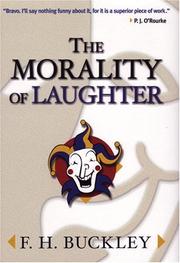
ISBN: 0472098187 Year: 2003 Publisher: Ann Arbor, MI : University of Michigan Press,
Abstract | Keywords | Export | Availability | Bookmark
 Loading...
Loading...Choose an application
- Reference Manager
- EndNote
- RefWorks (Direct export to RefWorks)
Comic, The --- Laughter --- Moral and ethical aspects. --- Ludicrous, The --- Ridiculous, The --- Comedy --- Wit and humor --- Laughing --- Emotions --- Nonverbal communication --- RIRE --- COMIQUE, LE --- ASPECT ANTHROPOLOGIQUE --- ASPECT MORAL
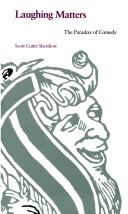
ISBN: 1122052057 0585271585 9780585271583 0870235095 9780870235092 9781122052054 Year: 1986 Publisher: Amherst, Mass. The University of Massachusetts Press
Abstract | Keywords | Export | Availability | Bookmark
 Loading...
Loading...Choose an application
- Reference Manager
- EndNote
- RefWorks (Direct export to RefWorks)
Comedy --- Comic, The. --- Comic, The --- Music, Dance, Drama & Film --- Drama --- Ludicrous, The --- Ridiculous, The --- Wit and humor --- History and criticism. --- History and criticism --- 82-2 --- Toneel. Drama
| Listing 1 - 10 of 134 | << page >> |
Sort by
|

 Search
Search Feedback
Feedback About UniCat
About UniCat  Help
Help News
News